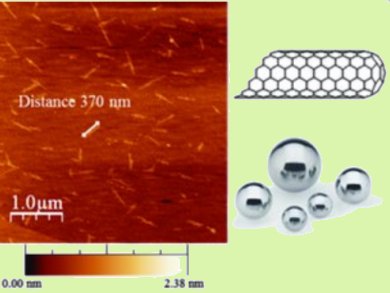The length and functionality of the modified carbon nanotubes (CNTs) affects their solubility, changing the way in which they can be manipulated. Most CNTs have low solubility in organic solvents, yet methods for modifying CNTs have focused on wet techniques like refluxing and sonication in the presence of large amounts of strong inorganic acids or organic solvents.
Ester Vázquez and colleagues, Universidad de Castilla-La Mancha, Spain, report the use of a planetary retsch ball mill, which consisted of stainless steel balls within a grinding bowl, to cut and disperse single-walled nanotubes (SWNTs).
Air, high rotational speeds, and long milling times led to partial or almost total destruction of SWNTs.
Milling under nitrogen at 500 rpm for 30 min obtained cut SWNTs with no additional defects. The Raman spectra showed that the number of defects does not increase upon milling. The alternative method of purification which uses strong oxidizing acids destroys small-diameter nanotubes. In the milling process, these were preserved.
Image: (c) Wiley-VCH
- Ball-Milling Modification of Single-Walled Carbon Nanotubes: Purification, Cutting, and Functionalization
N. Rubio, C. Fabbro, M. A. Herrero, A. de la Hoz, M. Meneghetti, J. L. G. Fierro, M. Prato, E. Vázquez,
Small 2011.
DOI: 10.1002/smll.201001917



![Synthesis of [c2]Daisy Chains via Mechanochemistry](https://www.chemistryviews.org/wp-content/uploads/2025/04/202504_RotaxanesWithSolidStateMechanochemistry-125x94.png)
